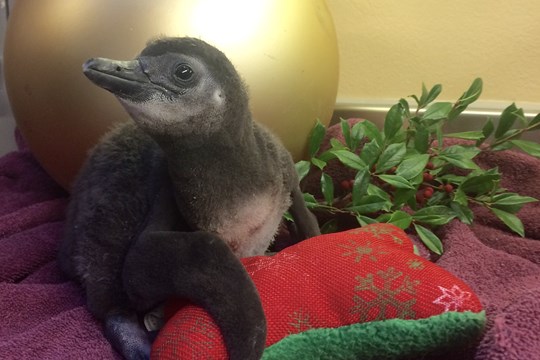
Saturday, Dec 03, 2016
City of Little Rock Public Relations (501) 371-6801
L. Lamor Williams 501-661-7201 desk 501-912-0088 mobile llwilliams@littlerock.gov Susan Altrui 501-661-7208 desk saltrui@littlerock.gov
LITTLE ROCK (Dec. 2, 2016) – Visitors to the Laura P. Nichols Penguin Pointe exhibit at the Little Rock Zoo can now see see the latest addition to the Zoo family: a baby penguin.
First-time penguin parents “Domino” and “Laura” (named for the donor Laura P. Nichols) successfully hatched an egg on Nov. 2. Their breeding was a recommendation of the African Penguin Species Survival Plan administrated by the Association of Zoos and Aquariums.
“This is the seventh chick we’ve hatched successfully at our zoo,” said Susan Altrui, acting Zoo director. “This birth adds another individual to the population of these endangered and beautiful animals. We’re proud to be a part of that.”
Domino and Laura, who is also one of the Zoo’s Animal Ambassadors, reared the chick in a nest box for the first few weeks – the most crucial time, but keeper staff have stepped in to hand-rear it so it will become comfortable around people and possibly be an Animal Ambassador like its mother.
The sex of the chick won’t be known for at least another week after blood testing results are available. The Zoo will hold a naming contest via social media once the chick’s sex is determined.
For now, the chick will be visible through the conservation room window of the Penguin Pointe exhibit. It will join the rest of the colony when it’s about 3 months old and big enough to be around adult penguins.
There are about 52,000 mature African penguins in the wild. Also called jackass penguins because of their braying donkey-like calls, these aquatic birds dine on fish and are well-suited to Arkansas’s climate.
###
About the Zoo
The Little Rock Zoo is accredited by the Association of Zoos and Aquariums. Look for the AZA logo whenever you visit a zoo or aquarium as your assurance that you are supporting a facility dedicated to providing excellent care for animals, a great experience for you and a better future for all living things. With its more than 200 accredited members, AZA is a leader in global wildlife conservation and your link to helping animals in their native habitats. For more information, visit www.aza.org.


 E-NEWS
E-NEWS
 EXPLORE
EXPLORE
 NEWS
NEWS
 TRANSLATE
TRANSLATE
